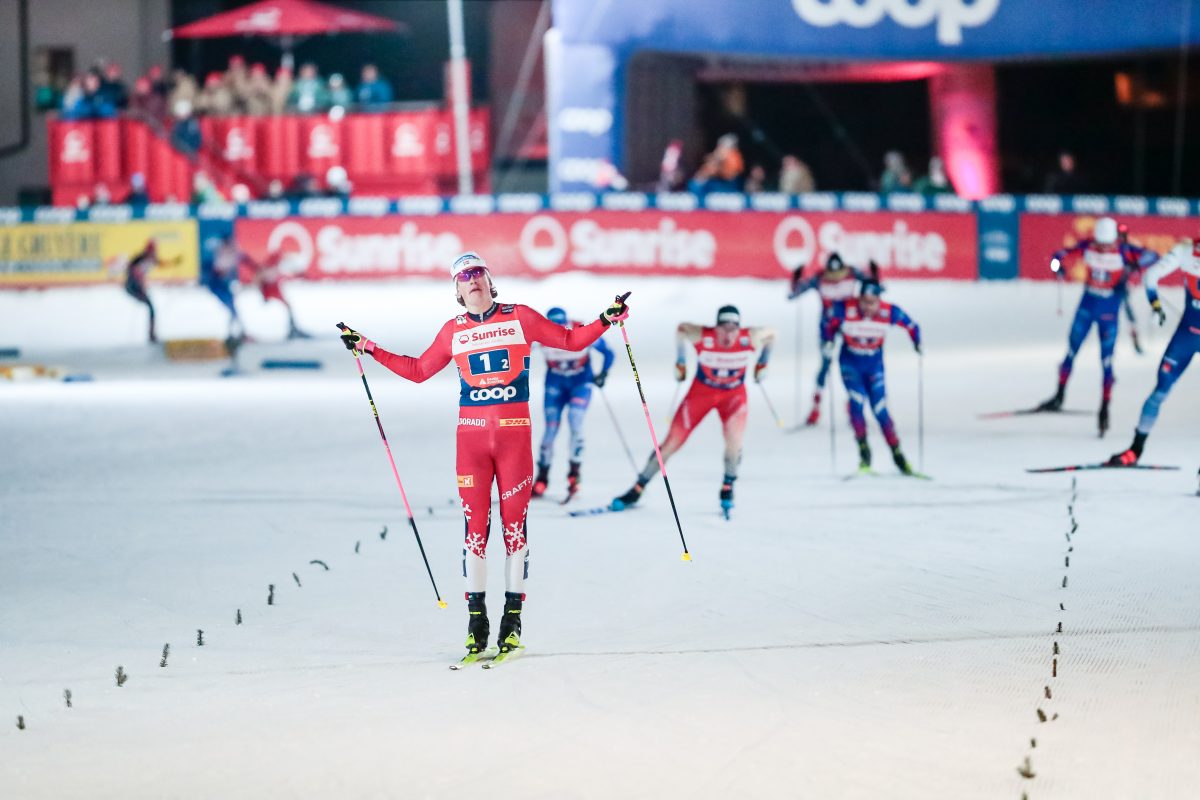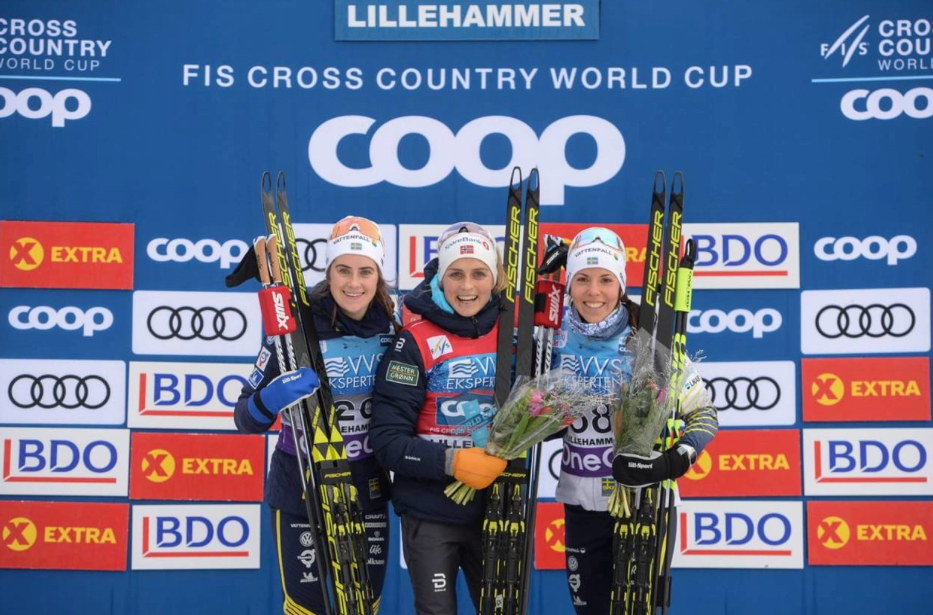
If thirty-year-old Therese Johaug of Norway is trying to scotch the dismay of the past two years, she’s doing it with her trademark high-turnover skiing and her top-step podium ways.
In April of 2018, Johaug’s 18-month ban, for having the prohibited anabolic steroid clostebol in her bloodstream, ended. Back during her last full season on the World Cup, 2015/2016, it was not uncommon for Johaug to gap the field by large margins in distance races. This nascent season, the gaps are more pedestrian.
She won the first World Cup distance race in Kuusamo, Finland, a 10 k classic interval start, by 22.5 seconds. Today, in Lillehammer, Norway during the second of three days of racing, she won the women’s 10-kilometer freestyle individual start race. Johaug crossed the line in 26:22.4 minutes beating Sweden’s Ebba Andersson by 9.2 seconds. For the twenty-one-year-old Andersson, it was her second career individual podium: she placed third in Kuusamo’s 10 k classic. Andersson’s teammate Charlotte Kalla was third (+15.7) on Saturday.
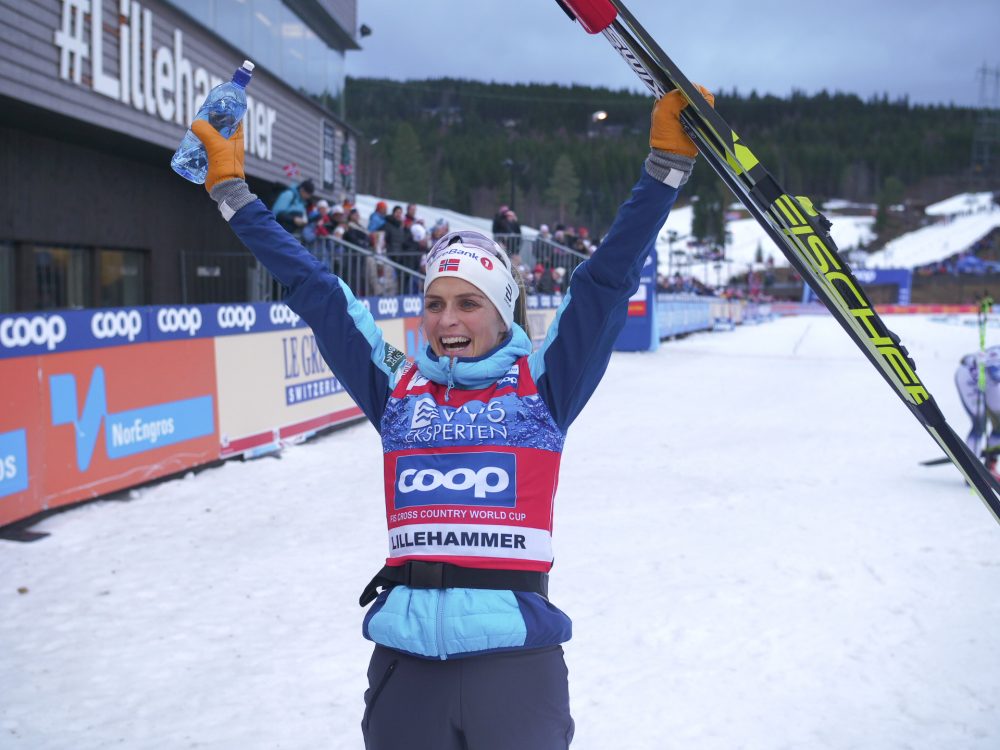
Johaug’s win on the second day of racing in Lillehammer was not trademark-decisive, she paced herself to earn the fastest split at every checkpoint. She bested Andersson by only 1.9 seconds at the 5 k mark, the gap bumped to 8.4 seconds at 8.3 k. By then, despite not having a huge gap of time, it was race over. Johaug never relented.
“The track in Lillehammer is really tough,” Johaug told the International Ski Federation (FIS) after the race. “It’s hard, but I love it. So I have to fight for myself. Although it was hard conditions, but good conditions for me. And I heard that Ebba [Andersson] was really fast behind me. So I had to work all the time.”
Despite her two distance wins, Johaug, not known as a sprinter, sits second overall on the World Cup, 18 points behind Russia’s Yulia Belorukova. Johaug is positioned 2.5 seconds behind first-place Kalla in the Lillehammer three-day tour.
The U.S. women put four athletes into the top-30.
Sadie Bjornsen of the U.S. Ski Team (USST) lead the way finishing in ninth (+1:17.0) after placing third in yesterday’s skate sprint. Bjornsen lives and trains with Alaska Pacific University in Anchorage, Alaska. In her post-race interview with FasterSkier’s reporter in Lillehammer, she noted she had been troubled by the news of Anchorage’s 7.0 magnitude earthquake on Friday.
“I was distracted for the last 24 hours because, as you know, that big earthquake happened in Anchorage,” Bjornsen said. “Unfortunately my house got, a pipe broke, and I didn’t know what the damage was. So it has been stressful. Everybody is Ok. Fortunately, my fiance and I were both not there, so we are just trying to figure what happened.”
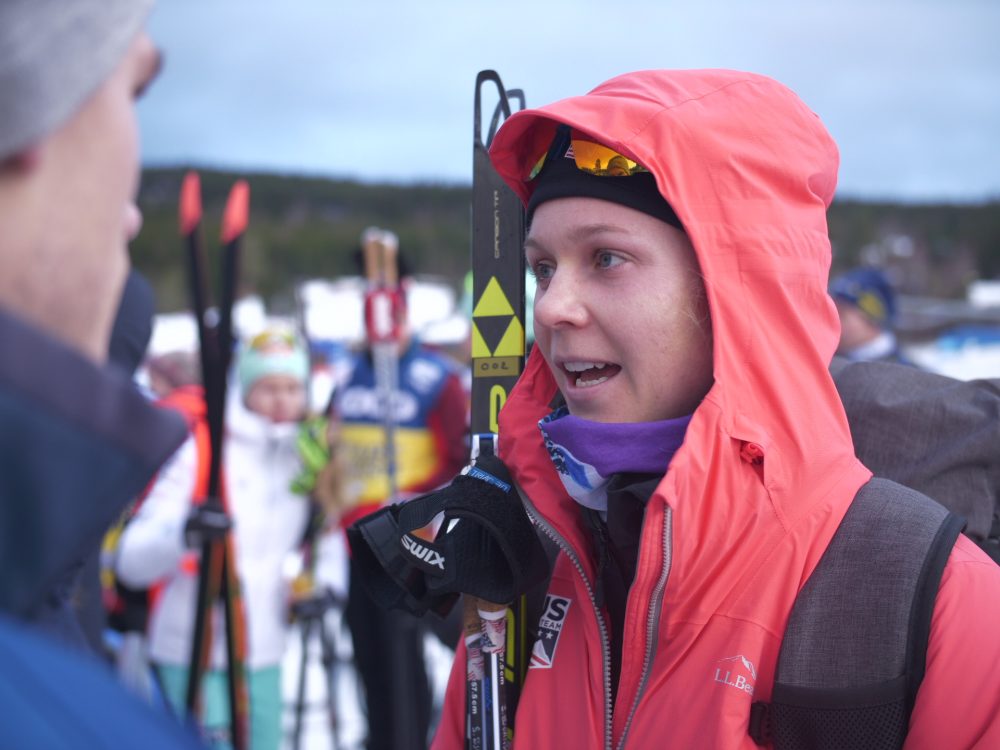
The distractions for Bjornsen didn’t last long as she immersed herself in race-mode on Saturday.
“I was trying to focus as I got into the race,” Bjornsen said. “But I think off the start it took me a little bit to get going. By the end, I started feeling good. Both times up the climb felt really good so that is encouraging … I was definitely encouraged by the feelings going up the climb, that is always a good measure of fitness and so I think when I get my brain one-hundred percent, it will be good.”
Rosie Brennan (APU) skied to 11th (+1:29.3) for her best career individual World Cup finish. Brennan, at twenty-nine, was not renominated to the U.S. Ski Team last season. Her return to the World Cup comes after a recovery from mono, and the disappointment of a lost season in 2018.
“I certainly have some fire in me,” Brennan wrote in an email. “I felt I was well on my way to getting these kinds of results when I got sick last year. So after feeling I was healthy again, I worked very hard to regain my mental strength and continue to increase my fitness knowing I wanted to prove to myself I am in fact capable of what I thought I was last year. I was able to make my own plan with my coach and train solely within my club team and that gave me confidence that I was doing what was best for me.”
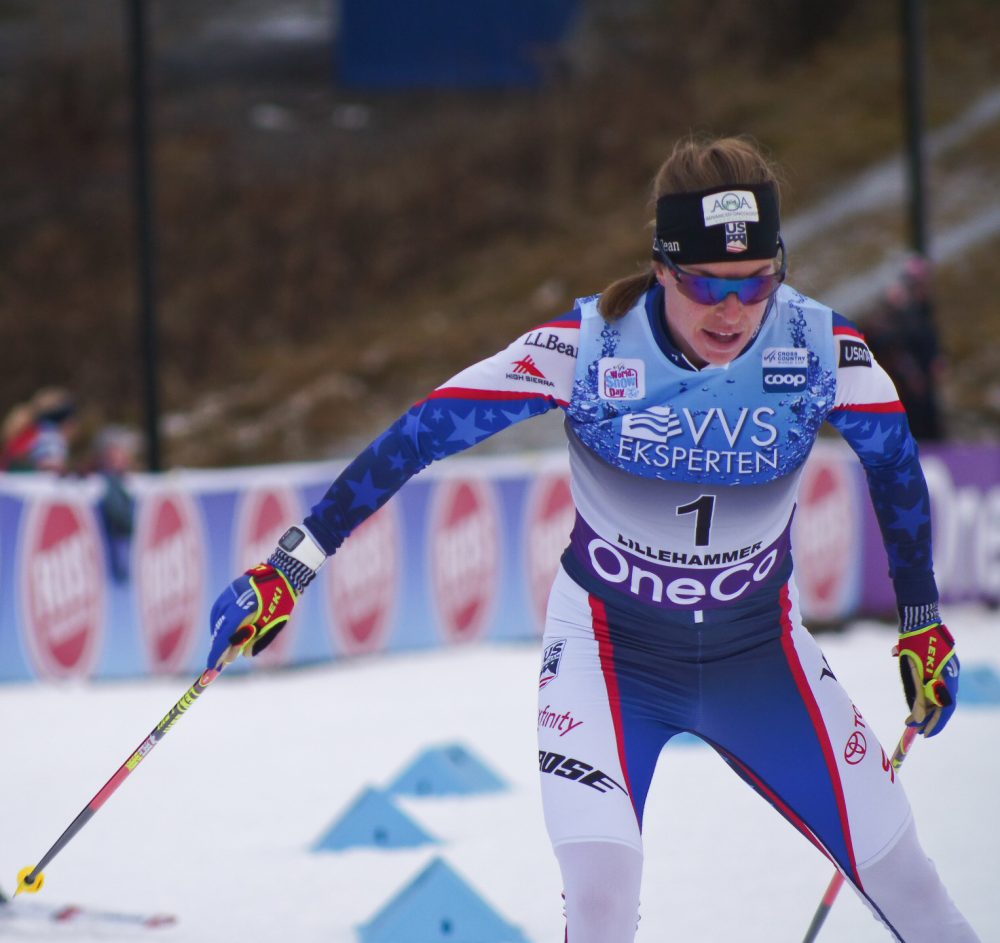
Brennan began the day as the first starter. Although bib 1 was a new experience, it proved a good fit.
“I have shockingly never been bib 1 in my career,” wrote Brennan. “I wanted to focus solely on my own skiing and then maybe catch a ride on the second lap. With all the mud on the course, it was difficult to catch a ride as skis were slowing down so much, so I really had no good indication of how my race was going. Focusing on my own race was my best strategy and it worked well.”
In yesterday’s sprint, Brennan qualified in ninth and placed 21st overall— no small feat for a World Cup race in Norway where the home country is given extra starts for an eager crop of speedsters to prove their chops. It was Brenna’s second-best career sprint result.
“I have come to a place where I am truly only racing for myself and to challenge myself every day,” Brennan wrote when asked what she had changed about her mindset as she entered the season. “I’m older and not so worried about making this team and that team so I’ve just been really enjoying racing and training and being with my club team.”
Jessie Diggins, second overall in last season’s World Cup, placed 12th (+(+1:29.9). Diggins is rebounding from a slight illness as she works through the second weekend of World Cup racing.
“I am not one-hundred percent healthy, I am like 95 percent,” Diggins told FasterSkier in the mixed zone. “And I could feel it today. Yesterday I felt pretty good. But then I was starting to feel kind of out of it. But today, I didn’t feel anywhere close to my top form. And that’s OK. You know, honestly, I am just grateful to be able to race at all. Because earlier in the week I was laying in bed thinking, ‘well shoot I am not going to get to race at all’. And I really love getting to race and working into the season. So for me, it is important to do this mini-tour to be able to find my shape later in the season.”
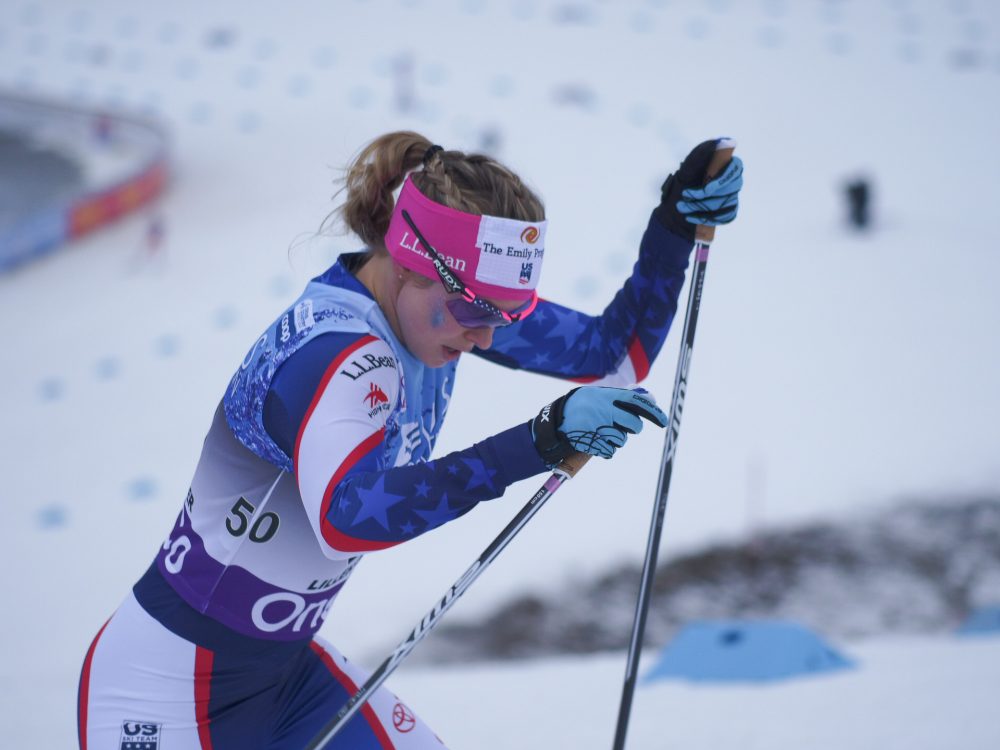
Diggins will begin tomorrow’s 10 k classic pursuit 1:24.9 minutes behind the first starter Kalla.
Caitlin Patterson, who skis for the Craftsbury Green Racing Project in Northern, Vermont, raced into the points for the 10th time on the World Cup. She finished in 30th, 2:28.2 minutes behind Johaug.
“Solid, but still processing it,” Patterson said of her race. “I think there were a lot of really good things about it, but we’re still so early in the season. Better than my race last weekend that’s for sure. But it still left a little bit to be desired; there were a few times when I was skiing near people and I just couldn’t quite hold on. Like Belorukova passed me from 30 seconds back and it felt like I was so close to being able to hold on with her. But I just wasn’t quite climbing as well. I don’t know, it had good parts and bad parts.”
Time wise, Patterson was in and out of the top-30 during the race. Her cohorts, in terms of race splits, were close.
“I think I’ll take the few little glimmers that I had that I can stick with people who are skiing faster,” Patterson said. “Keep building on that and definitely exert a lot of effort tomorrow to stick with people because I know it’s a little easier to be in the draft or just follow someone else’s tempo. So tomorrow in the pursuit start, I’ll just find a good group and stick with it.”
Finishing outside the points for the U.S. were Kaitlynn Miller (CGRP) in 60th (+4:10.4), Ida Sargent of the USST 63rd (+4:18.4), and Kelsey Phinney (SMS T2) 65th (+4:22.5).
Racing concludes in Lillehammer, Norway tomorrow with a 10 k classic pursuit.
Jason Albert
Jason lives in Bend, Ore., and can often be seen chasing his two boys around town. He’s a self-proclaimed audio geek. That all started back in the early 1990s when he convinced a naive public radio editor he should report a story from Alaska’s, Ruth Gorge. Now, Jason’s common companion is his field-recording gear.

